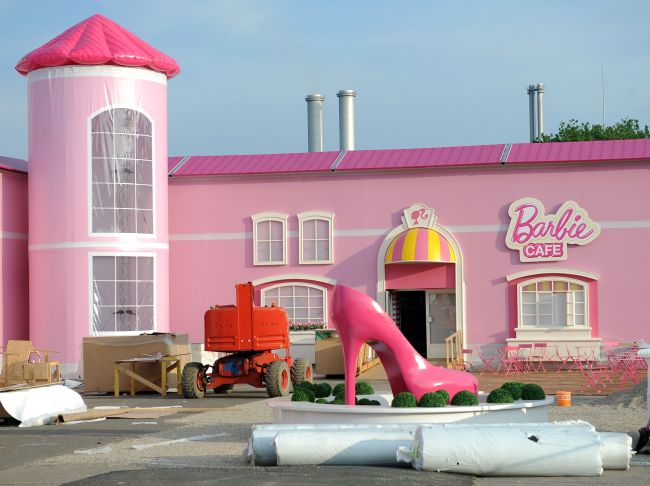BERLIN (AFP) ― The opening this month of the first life-sized Barbie Dreamhouse in Europe may be the fantasy of many a little girl, but Berlin feminists are mobilising against what they call a sexist icon.
With her ironed-straight blond tresses, doe-like baby blue eyes, blinding smile and super-human measurements, the mistress of the giant Barbie mansion has become a lightning rod ahead of the May 16 inauguration.
Just a few steps from Alexanderplatz, the main shopping district of east Berlin, the 2,500-square-meter slice of Malibu lifestyle is nestled between a railway and old communist housing blocks.
Inside, young Barbie fans can pretend to bake cupcakes in a marvellous kitchen, rummage through her sequin-studded wardrobe in the blonde bombshell’s “endless” walk-in closet and lounge in her ― pink, of course ― living room while admiring hundreds of dolls on display.
“For 22 euros ($29), you can have two careers ― model or pop star! What kind of image is that presenting to young women?” grumbles Michael Koschitzki, the proudly feminist male leader of a grassroots group of opponents of the Barbie Dreamhouse, and a member of the youth wing of the far-left party Die Linke.
 |
This picture taken on May 8 shows the exterior of the Barbie Dreamhouse in Berlin. (AFP-Yonhap News) |
A Facebook faction called “Occupy Barbie Dreamhouse,” created in March with a wink at the New York anti-greed movement Occupy Wall Street, has drawn more than 1,000 supporters since its launch in March when the Berlin plans came to light.
It regrets that “the vast majority of little girls play with a doll that, if she were real, would be anorexic and whose life would consist of waiting for Ken in the car”, Koschitzki said.
An angry fist piercing adverts for the attraction was printed on 10,000 flyers to publicize the fight against such “sexist propaganda” in a country headed by a childless woman and in which battles of the sexes are being fought on several fronts.
Germany, where combining family and work is notoriously difficult, has a fertility rate among the lowest in western Europe and is debating binding quotas for female executives to diversify its overwhelmingly male-dominated boardrooms.
Having weathered half a century of feminist rage, US Barbie manufacturer Mattel notes that it has modernised the doll’s image, moving beyond the beach beauty to create surgeon dolls and even a presidential candidate.
“Barbie has again become a tool for some to advance their own agenda,” a spokeswoman for the company’s German unit said.
The conflict is due to come to a head on May 16, the opening day, with a planned demonstration under a “Occupy Barbie Dreamhouse” banner.
“We will be very happy if we can bring together 100 people,” admits Koschitzki, whose protest group includes several leftist organisations and the initiative Pinkstinks, which is fighting against the gender-stereotyping produced by the colour’s hegemony in the little-girl universe.
Barbie’s Dreamhouse, which was conjured up by Vienna-based Event Marketing Service with a licence from Mattel and has a twin sister at a shopping mall in southern Florida, is already drawing curious families.
A 28-year-old Israeli tourist who gave her name as Lucy said all the pink caught her attention, as she pulled out her camera.
Having played with Barbies as a child, she did not see a problem with the Dreamhouse, although she admitted it could “influence a young girl so she thinks that everyone has to be blonde, tall and big-breasted.”
“It’s up to parents to explain that it’s just a doll and not an example,” said Emma, a 36-year-old Berlin mother of two girls, aged four and six, who shook with anticipation to get inside the doll paradise.
Barbie, for her part, will have to pack her bags on Aug. 25. The Dreamhouse will then be dissembled, placed in moving crates and sent on a tour of other European cities.






![[Herald Interview] 'Trump will use tariffs as first line of defense for American manufacturing'](http://res.heraldm.com/phpwas/restmb_idxmake.php?idx=644&simg=/content/image/2024/11/26/20241126050017_0.jpg)

![[Exclusive] Hyundai Mobis eyes closer ties with BYD](http://res.heraldm.com/phpwas/restmb_idxmake.php?idx=644&simg=/content/image/2024/11/25/20241125050044_0.jpg)